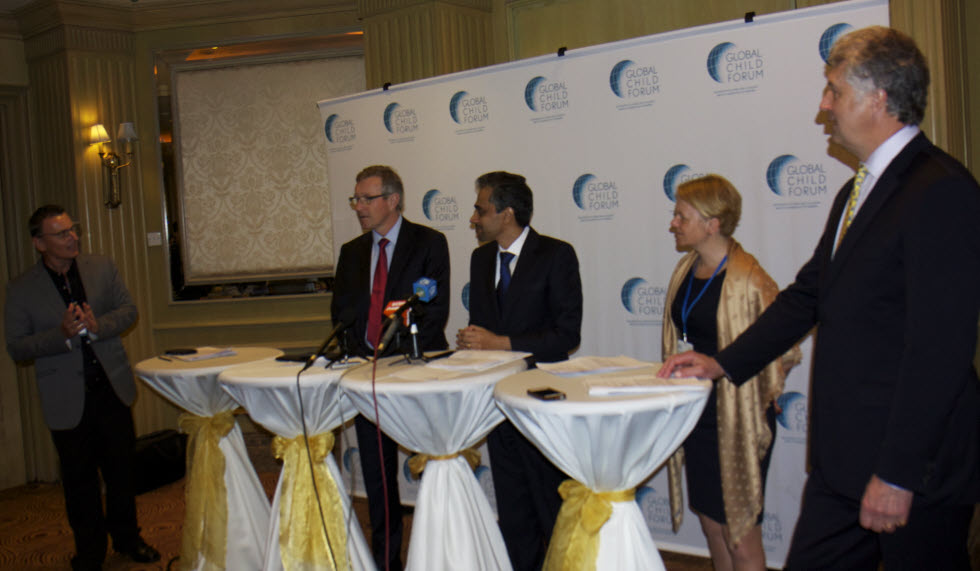 Connecting to Their Majesties of Sweden’s first regional Southeast Asia Global Child Forum, held in Kuala Lumpur, Malaysia, on 5 May a benchmark report on Children’s Rights and the Corporate Sector in Southeast Asia was timely also launched.
Connecting to Their Majesties of Sweden’s first regional Southeast Asia Global Child Forum, held in Kuala Lumpur, Malaysia, on 5 May a benchmark report on Children’s Rights and the Corporate Sector in Southeast Asia was timely also launched.
The benchmark study, undertaken by Boston Consulting Group (BCG), analysed the reported practices of 289 companies operating in the ASEAN region including Indonesia, Malaysia, Thailand, Singapore, Vietnam and Philippines spanning over nine industry sectors. This data were then used as a benchmark to assess how the companies promote children’s rights in their business value chains.
The resulting report shows that most industries in the ASEAN region significantly underperform compared to the global average, but outperform Middle East and North Africa (MENA). It was revealed that the companies have very few activities to report in tandem with the pattern of the global sample. Only 29% of the surveyed companies in the region have a child labour policy in their compliance, which is much less prominent than the global average of 62%, and only 24% adhere to international standards.
“The 2.1 mark is better perhaps than the Middle East, but still below the sub-Saharan part of the world. We had hoped that companies, certainly the leading ones, would have a bit better performance,” commented Ulf Karlberg, Chairman, Partner Advisory Board of the Global Child Forum.
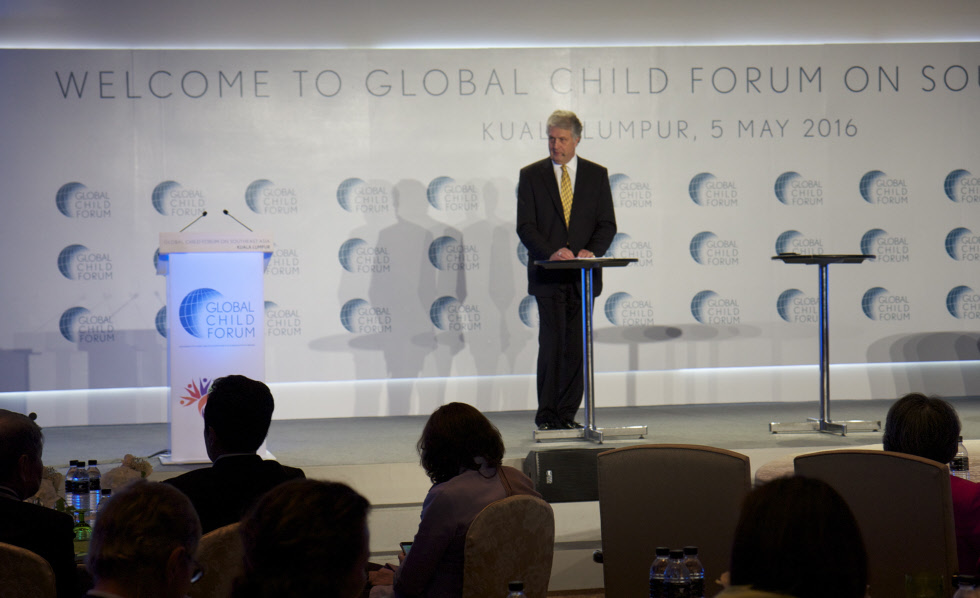
“We can inspire them to take child issues seriously at board level. Some leaders who take this seriously get respect. Other statistics concerning those who have not even started thinking about sustainability and children’s rights, takes down the average for the regional benchmark. We hope within say 5 years the ranking should increase,” he continued optimistically.
Global Child Forum urged businesses in the region to put children’s rights as a top priority in corporate governance in order to bring up the regional benchmark score from 2.1 to 5 (out of 9).
The independent multi-stakeholder platform constitutes an information service and inspiration to the world, and their objective is to engage businesses in the next generation, according to Ulf.
Their point of departure for the efforts is the United Nations Children Act, ratified by all the countries in Southeast Asia.
“We encourage business to bring up the regional benchmark score and to focus not solely on child labour but to address issues such as product safety, marketing to children and sexual exploitation,” commented Dr. Fiona Rotberg, Research Director of Global Child Forum.
She said a lot still needs to be done. Hon. Dato’ Sri Rohani Abdul Karim, Minister of Women, Family and Community Development, Government of Malaysia agreed on this note: “The results of the study also tell us that there is a lot of work to do, and huge opportunities for companies and others to act – as children’s rights have not yet made it into the board rooms and strategic business analyses if most companies in the region.”
70% of the ASEAN companies are active at driving programmes to promote children’s rights, which is well above the global average of 48%, but only 3% address children’s issues at board level.
“In some countries governments are putting pressure on companies. In other parts of the world it is the corporate sector driving governments to do much more. This movement is partly driven by both private and government sectors. With international companies taking the lead good news travel fast,” elaborated Ulf Karlberg.
“Understand these issues. Make sure you have the policy. This is a Board responsibility. Then you implement, and being transparent and make audits. Those who have not understood that will wake up one day and understand.”
85 – 90 percent are SMEs, added Ulf.
“Issues do not concern only biggest companies. Even start-ups today are fully aware. But in this part of the world there is also a lot of agribusiness.”
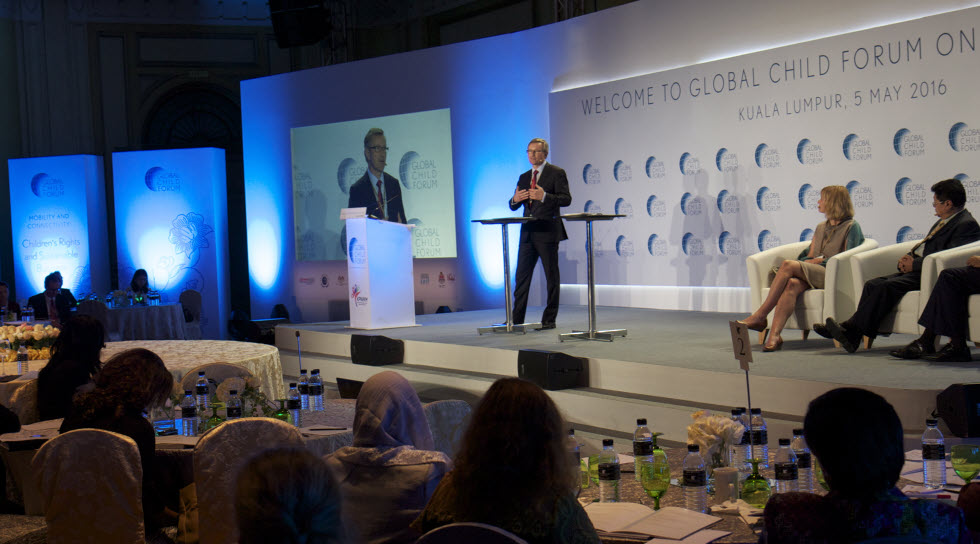
Per Heggenes, CEO of Ikea Foundation commented on Ikea’s role having a larger challenge, being a multi-national company.
“It has to do with values and looking at your role and in society; it’s not a cost but an investment. We do not talk about CSR; it’s rooted in how we think about the way we do business.”
They feel that children are the most important in the world and look at everything from a child’s perspective.
“25 years ago we set up specific children’s issues. It was a natural thing for Ikea to do as it was ingrained in the values of the company.”
“Ikea has very strong code of conduct. And it is very black and white – if you don’t meet the criteria you are out. One can be very clear about these standards, we can give time to achieve but we expect change. If we set a standard good for suppliers it will benchmark for the society.”
“We put a lot of efforts in working with governments to improve education. We can engage with NGOs who engage with government. How can we help the root causes of child labour, is by assisting having access to education.”
Especially businesses can be a driver for immediate and lasting change in the lives of children and young people,” commented Åse Bäckström, Managing Director of Global Child Forum.
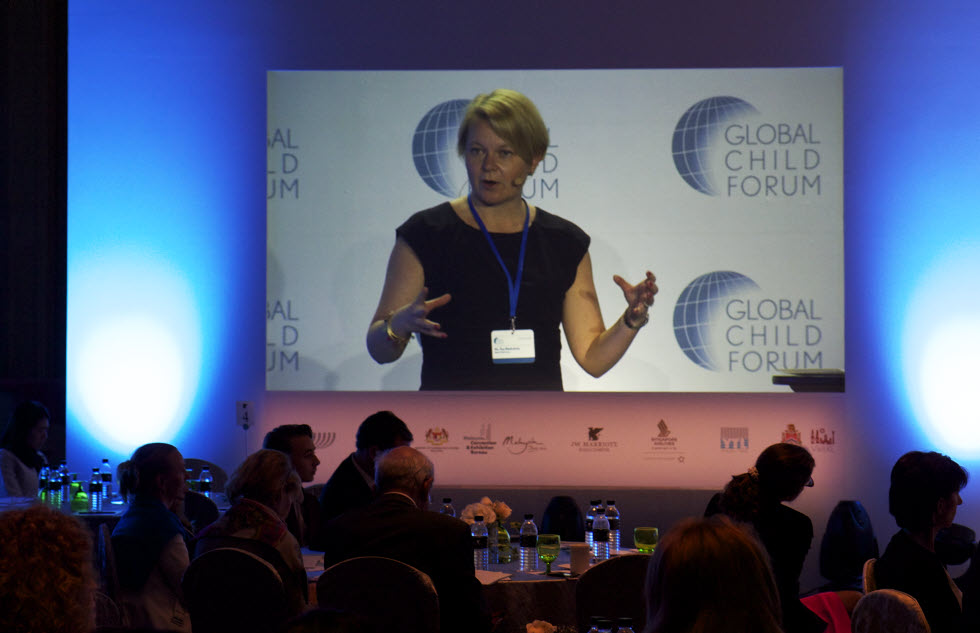
“It’s an important thing for a business to identify is how does the company impact children and how does children impact companies. There is some good news in the report and also work still left to do. The current status really good when it comes to programmes, where the regional average is extremely high. 70 per cent of companies do run programmes. That is a really good number. Going forward, children’s rights is not CSR it is core business. What we want to achieve in this region is for businesses to give children’s rights top priority.”
“Companies should stop using child labour. Many companies do not allow it even though they don’t report on it. As we start working on those issues the performance will evolve. The benchmarking score should be five. Then you are among the global average.”
“If we should be a global forum that raised the global issues – and not only Swedish issues or very international topics – we needed to go out to different parts of the world and take the temperature on the issues there,” the managing director commented on the purpose of having the regional forums. “So we decided that in order to be a trustworthy player we needed also the regional perspectives. And then we must go to the respective regions and have forums with, for and in the regions. We should then focus on looking at how the reality is regionally; what gap is against protecting children’s rights, and then use that perspective as point of departure. Like a think tank.”
Åse told ScandAsia that they do these reports in order to generate interest around what the situation is now.
”We have used the same criteria and done a study on the Middle East, and on southern Africa and have a global study that we will now repeat after three years. So the idea is to do the global study every third year and the follow-up regional studies continuously, and then connect to that, as we really would like to measure the progress, and use this as a push.”
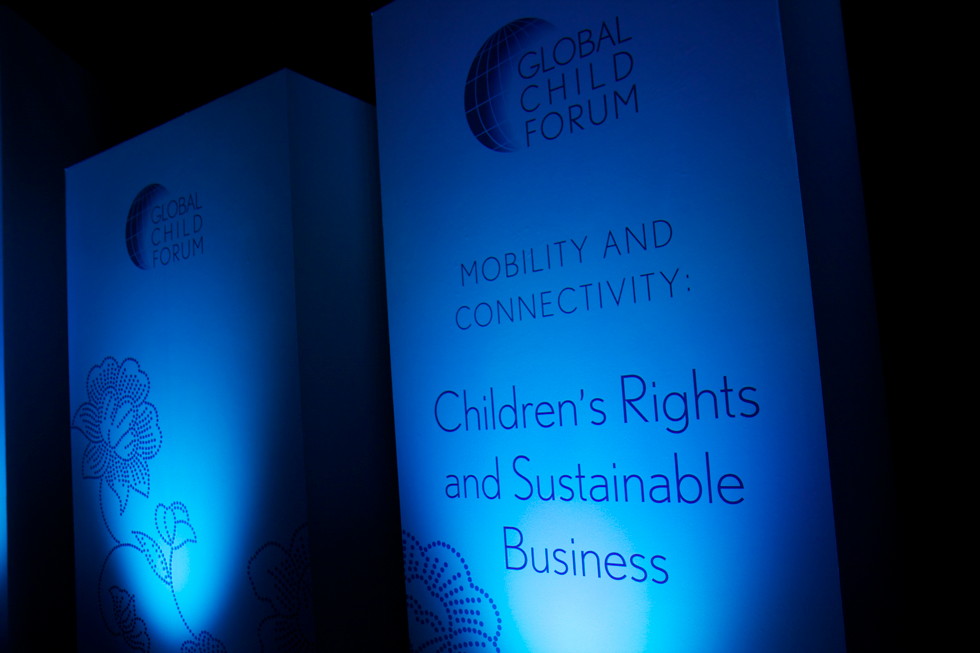
Concerning their focus on the business world she said that this is what differentiates Global Child Forum from the usual children’s rights organisations.
“We view ourselves as a business organisation. We are financed by the business world and we work with their issues in order to – together with the businesses – push the children’s rights agenda. If one thinks one step further: children’s rights are being abused, why? Children are forced to child labour. Who is the reason behind child labour? It is the corporations. Of course as a consequence of lack of legal systems that can properly protect the children. But if the businesses would not use child labour, it would not exist. A way to push the change is the make them take full responsibility and be advocacies themselves for the issue.”
“Charity can reduce but does not change the circumstances, whereas if companies ensure they are not violating in their business they in effect push the agenda and put demands on governments for supplying good education. Many children work because it is the only way for their family to make a living or because they have no education or that education is not available. So we see that it is the business world that is the catalyst for change.”
When it comes to adopting best practices she said that businesses look at their own sector.
“And the major question concerning the business world and children’s rights is the difficulty in seeing where we are having an impact on children.”
Taking a bank as example, and how it can affect children she said: “If one thinks that a bank’s systems can be used for transactions relating to trafficking or sexual abuse of minors then that is a to-the-point issue for that business.”
The non-profit foundation regularly organises Forums to provide a unique platform for the identification of opportunities on how businesses can contribute to the promotion of children’s rights.
At the debuting forum for Southeast Asia, leaders from business, civil society and government shared best practices for how companies can strengthen children’s rights within their operations.
See also:
